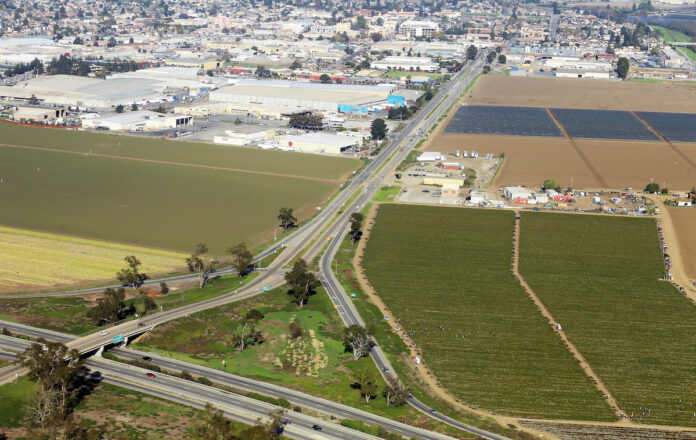
WATSONVILLE—In a special meeting as unpredictable as it was tense, Watsonville City Council could not come to a consensus on a deal that would have made a minor alteration to a critical ballot measure for the Nov. 8 election.
The elected leaders on Thursday neither approved nor denied an agreement pitched as a compromise between the city and the Committee for Planned Growth and Farmland Protection that would have slightly altered the latter’s ballot measure, which seeks to extend Watsonville’s current restrictions on outward growth—better known as Measure U—through 2040.
The deal would have given Watsonville the opportunity to possibly annex and develop a 13.6-acre agriculture field at 320 Lee Road—better known as the Redman House property on the west side of Highway 1.
Motions to deny and approve the settlement both failed 3-4. Mayor Ari Parker and councilmembers Jimmy Dutra and Lowell Hurst backed the settlement in both votes, while councilmembers Eduardo Montesino, Francisco “Paco” Estrada and Rebecca Garcia were against it.
Councilmember Vanessa Quiroz-Carter first voted against the denial of the agreement moved by Montesino, but then flipped her vote when approval of the agreement was moved by Dutra.
Just before the second vote, Quiroz-Carter said she did not wholly agree with the settlement, but saw the deal as the only way for Watsonville to grow over the next 20 years.
“It’s not perfect, but I don’t want to lock us in for another 20 years,” Quiroz-Carter said. “If this is what we can do to make some growth happen, then I’m willing to compromise.”
To which Montesino replied: “If you vote for this, you’re locking us in for 20 years. And [annexing the property] is only a maybe because I have no trust that we won’t get sued. It’s been done before. By your affirmation, you lock us in for 20 years. And our community cannot grow.”
After the failed votes, the council directed staff to draft a countermeasure that they would run against the committee’s measure in the Nov. 8 election if another agreement is not reached.
A countermeasure or compromise must be completed and approved by the council by July 7 to meet county election requirements.
At the end of the meeting, the council identified areas that could be included as possible annexation sites in the countermeasure or updated agreement. This included 77 acres next to Wagner and East Lake avenues that staff has previously said could produce around 860 housing units and areas off Freedom Boulevard and West Beach Street that could be ideal for commercial development.
Measure U is an amendment to Watsonville’s general plan approved by voters in 2002 that halted the city from expanding its footprint, save for a few locations determined by a year-long “community visioning” process.
Its impact on Watsonville has been difficult to determine. While it has indeed protected agricultural and natural land that surrounds the city, it has also made it difficult for the municipality to address its growing housing and economic needs.
Proponents of the measure gathered 2,400 signatures to place the renewal on the ballot. They say it has been an overwhelming success that helped Watsonville focus on infill housing development and preserved the Pajaro Valley’s role as an agricultural giant.
But the city has said that if the restrictions are extended through the next two decades, they would create a “significant barrier” to meeting housing goals—the city is responsible for accommodating more than 2,000 homes over the next eight years alone.
A half-dozen people spoke during public comment, all in support of the agreement, which city attorney Samantha Zutler said was the product of 48 hours of back-and-forth between the city’s and committee’s legal teams.
Those in favor included Haj Tut, whose family would lead the development of the 320 Lee Road property if eventually annexed and approved for commercial use—the same family constructed the new Hampton Inn & Suites business complex across the street.
The discussion amongst the council became testy at times, as supporters of the agreement were seemingly caught off guard by the opposition from their colleagues.
Those in favor questioned whether those against the agreement were asking for too much and if they were being shortsighted in what was being offered to the city.
“If this fails, the original measure is going on the ballot and, if that passes, that opportunity to develop 320 Lee Road is out the door,” Dutra said. “At the end of the day, we need to be smart about the decisions that we make.”
Added Parker: “You guys don’t have a broader sense of where this could lead us to and how this moves us forward. Nothing’s ever perfect and compromise, in itself, is never perfect. But this is a good step forward.”
Those opposed to the agreement said that it ultimately did little to address the city’s mounting housing needs and that such a large decision about the future of the city should be a more collaborative process.
“I understand that you want to protect farmland and we don’t want to take all the farmland, but we need better avenues for businesses and housing,” Montesino said. “You see the overcrowding in my area. You live it everywhere when you go outside on Rodriguez and all these streets … the housing crunch, the high prices are moving a lot of the community that were born here, that were raised here.”
Added Garcia: “Measure U has been successful but it’s been successful because there was so much community engagement at the outset of it. I mean we had meetings after meetings and there was so much compromise and so much negotiation. Measure U was a result of all of that community engagement and that hasn’t existed in this process.”








